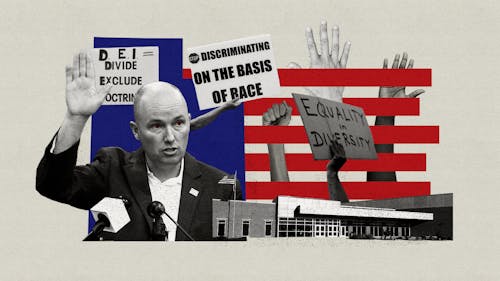EDITORIAL: Diversity, equity and inclusion under seige in era of bans

Recently, Diversity, Equity and Inclusion (DEI) programs have come under fire from government officials. Utah has emerged as the most recent state, joining seven others, in implementing a ban on DEI initiatives within all state government agencies and universities, citing biased hiring practices and detrimental effects on academic freedom.
Considering that the population of Utah is 90 percent white, gender-affirming care for transgender youth has been outlawed, and Utah ranks 50th out of 50 states in women's rights, the necessity for these policies is especially pronounced.
Training, organizational policies and practices and organizational culture are the three primary areas of concentration for DEI programs, according to Erica Foldy, a professor at New York University's Wagner Graduate School of Public Service.
These initiatives, prompted by the need to help make places of work and learning more diverse and equitable, may take the form of instituting accessibility designs for individuals with disabilities, tackling discriminatory hiring practices and pay disparities or conducting anti-bias training sessions.
The impact of DEI training on academia cannot be overstated. It enhances critical thinking and empathy among students, ensuring that every voice is acknowledged and respected and creates the foundation for a comprehensive education.
This evidence sharply contradicts the justification provided by Gov. Spencer Cox (R-Utah), who argues that DEI programs show no evidence of improvements. In actuality, DEI programs bolster academic freedom by allowing students to engage in conversations that challenge their biases and facilitate their growth.
A diverse student body is crucial for fostering a climate of creativity, inquiry and innovation. Through exposure to peers from varied backgrounds, diversity enriches the educational experience by offering students a more vibrant and cultured understanding of the world around them.
Studies have shown that students benefit cognitively from interacting with peers who differ from themselves, as they are introduced to new ideas and challenges that enhance their critical thinking and problem-solving skills. Furthermore, attending diverse schools prepares students to navigate an increasingly diverse society more effectively in adulthood — a competency that is highly valued by employers.
The prohibition of programs that acknowledge our differences perpetuates the structural violence that is ingrained in our society. As such, the ban's impact on mental health presents many concerns, including the alienation of minority students.
Research indicates that perceived discrimination from peers and adults is closely linked to lower self-esteem and higher levels of depression symptoms among Black, Asian American and Latino high school students.
In addition, stress caused by race-related issues can trigger a range of negative emotions, such as "anger, hurt, frustration, bitterness, helplessness and hopelessness," alongside a propensity to react aggressively, according to an article. These experiences can, in turn, exacerbate symptoms of depression and anxiety.
The effects on mental health are not limited to the minorities experiencing discrimination. A lack of diversity could contribute to political extremism, arising when majority groups possess limited awareness or understanding of the challenges faced by their minority counterparts.
It has been shown that increasing levels of inclusion and tolerance within communities can help societies fortify themselves against the risks of violent extremism.
Unfortunately, Utah is not alone in the decision to ban programs that could help to protect students and other communities from these effects, with indications that similar bans on discussions of race and gender in public school classrooms may be authorized in the future.
The implications of these actions extend far beyond the scope of the DEI programs themselves because they touch on issues concerning broader political and social attitudes. These include affirmative action policies and the 2023 Harvard case against it, a step backward in the progress of the nation.
DEI faces numerous challenges, including misconceptions that minority hires are favored over others who are more qualified, which leads to distrust and resentment. Misunderstandings also abound in regard to terms like "critical race theory," which are often conflated with DEI issues.
It is important to recognize the roles of DEI, which go beyond mere training or contract formalities. The need for genuine, authentic implementation and effort is essential, evidenced by the aforementioned positive outcomes in academic settings where DEI principles have been integrated.
In recent years, Rutgers' administration has adopted numerous plans to support DEI initiatives across campuses, which has resulted in several positive outcomes within its community. These include programs such as "Speak Up!," a campaign centered on preventing bias, as well as a diversity action plan outlining goals and strategies to better foster an inclusive community.
These programs are essential in light of the fact that Rutgers has an 80 percent graduation rate for first-generation and low-income students, 54 percent higher than the national average. This demonstrates the potential benefits of DEI programs, indicating that a comprehensive effort to ensure the inclusion of individuals from all walks of life can lead to real outcomes.
While not all students and faculty members at Rutgers have embraced these principles of integration in full, the implementation of DEI marks a step forward. Persisting in our efforts for diversity, equity and inclusion can lead to real progress, enabling us to recognize that meaningful change is an ongoing process that requires continuing commitment.
The Daily Targum's editorials represent the views of the majority of the 155th editorial board. Columns, cartoons and letters do not necessarily reflect the views of the Targum Publishing Company or its staff.



